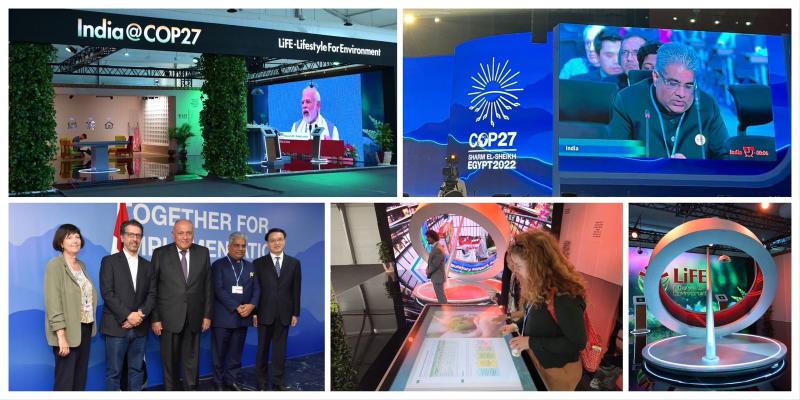
COP27: India welcomes inclusion of Sustainable Lifestyle in Sharm El-Sheikh Implementation Plan, agreement on loss and damage funding
20/11/2022
BLOG
An eventful Conference of Parties (COP27) of the United Nations Framework Convention on Climate Change (UNFCCC) today came to a close after hectic negotiations and long hours of brainstorming.
Despite the many differences and individual concerns the countries of the world showed remarkable seriousness in trying to make significant headways on all issues that impact the fight against climate change.
For India, there were many positives to be drawn from COP27. The most significant for us was the inclusion of Sustainable Lifestyle in the Sharm El-Sheikh Implementation Plan. It is Hon’ble Prime Minister Shri Narendra Modi who has made the pitch for an Environmentally-Friendly Lifestyle, through his mantra of Mission LiFE and the world today moved in that direction by including Sustainable Lifestyle and Sustainable Patterns of Consumption and Production for efforts to address climate change, in the Implementation Plan.
The Implementation Plan has laid importance on pursuing an approach to education that promotes a shift in lifestyles while fostering patterns of development and sustainability based on care, community and cooperation. India welcomes these moves as our Hon’ble Prime Minister has been the one to first talk about lifestyle changes at the individual level towards building a sustainable Planet.
Speaking at the Closing Plenary as a representative of India, I stated that COP27 has been significant for it is here that an agreement has been secured for loss and damage funding arrangements including setting up a loss and damage fund. The world has waited far too long for this. The consensus over this was reached after untiring efforts from one and all.
I also welcomed the inclusion of transition to sustainable lifestyles and sustainable patterns of consumption and production in our efforts to address climate change in the cover decision during my address.
COP27 has established a 4-year work program on climate action in agriculture and food security. Agriculture, the mainstay of livelihoods of millions of small farmers, will be hard hit from climate change. I stated that we should not burden them with mitigation responsibilities.
Being sensitive and caring towards our farmers, India under Hon’ble PM Modi has indeed kept mitigation in agriculture out of its Nationally determined contributions (NDCs).
Nations at COP27 are also establishing a work program on just transition.
I stated that for most developing countries, just transition cannot be equated with decarbonization, but with low-carbon development. I underlined that developing countries need independence in their choice of energy mix, and in achieving the Sustainable Development Goals. I once again stated that developed countries taking the lead in climate action is therefore a very important aspect of the global just transition.
Salient outcomes of COP27
What COP27 has achieved in agreeing upon is:
Acknowledging the urgent and immediate need for new, additional, predictable and adequate financial resources to assist developing countries that are particularly vulnerable to the adverse effects of climate change in responding to economic and non-economic loss and damage associated with the adverse effects of climate change, including extreme weather events and slow onset events, especially in the context of ongoing and ex post (including rehabilitation, recovery and reconstruction) action.
Establishment of a new Funding Arrangement for assisting developing countries that are particularly vulnerable to the adverse effects of climate change, responding to loss and damage, including a focus on addressing loss and damage by providing and assisting in mobilizing new and additional resources, and that these new arrangements complement and include sources, funds, processes, initiatives within and outside the Convention and the PA.
Establishment of a Fund for loss and damage for responding to loss and damage whose mandate includes a focus on addressing loss and damage.
Establishment of a Transitional Committee on the operationalisation of the new Funding Arrangements with clear Composition, Mandate, and timelines; to be adopted after one year at COP28.
This Committee shall consider inter alia institutional arrangements, elements, identify & expand sources of funding, coordination and complimentarity with existing funding arrangements and will be informed by current landscape of institutions, gaps within, priority gaps, effective ways to address gaps and identify potential sources of funding including wide variety of sources, including innovative sources.
Two workshops in 2023, Secretariat to prepare a Synthesis Report, Invitation for submissions for 2nd and 3rd Glasgow Dialogues to be held at COP28 and 29 and all these processes feeding into the outcome of this agenda item as a single process with focus on operationalization of the funding arrangement.
Invitation to UN agencies, Intergovernmental agencies, Bilateral and Multi-lateral agencies, International financial institutions to submit inputs on scope as also indulgence of SBI, UN Secretary General etc.
COP27 has come to a close and it is now over to nations to fulfil the commitments made as COP27 was rightly called the COP of Implementation.
